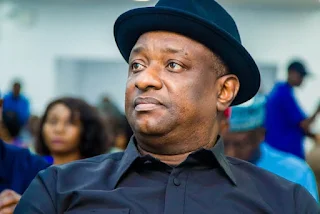Since the beginning of Nigeria's current democratic dispensation, Delta State has consistently had representation in the federal cabinet through ministerial appointments. However, despite this consistent representation, it remains difficult to identify any significant projects influenced by these ministers for the benefit of the state. Over the years, there has been little visible impact in terms of development or infrastructure that can be credited to these federal representatives.
The current minister from Delta State appears to follow the same pattern as his predecessors. Since his appointment, he has distanced himself from the state, maintaining a noticeable absence from his home constituency. On the rare occasions when he visits, he remains heavily shielded from the public, with security personnel and aides acting as buffers between him and the people he is supposed to serve. This detachment raises serious concerns about his commitment to Delta State, suggesting that he is more concerned with his personal and family interests than with representing the state on a national level.
In a period marked by economic hardship and widespread suffering, the silence from Delta’s minister is particularly striking. Federal government palliatives have been announced to cushion the impact of these difficulties, yet there has been no communication from him to the people of Delta State. This glaring absence of leadership and empathy makes one question whether he truly cares for the citizens he represents or if he has settled into the bureaucratic comfort of life in Abuja, far removed from the daily struggles of his constituents.
Ministers, especially those representing regions with significant economic challenges, ought to be more than just figureheads in the federal cabinet. They should be advocates for their people, fighting for policies and projects that will bring development and relief to their constituencies. The current minister’s behavior, however, suggests that he may not see the people’s needs as a priority.
This brings us to the issue of the Osubi-Warri Airport. In February 2024, Festus Keyamo, the Honourable Minister of Aviation and Aerospace Development, proudly announced that President Tinubu had approved N2 billion for the expansion and upgrade of the Osubi-Warri Airport's runway and tarmac. This project is crucial for enabling the airport to accommodate larger aircraft, which would bring significant economic benefits to the region. Yet, several months later, there has been no meaningful progress. It is worrisome that the minister has failed to take the necessary steps to commence this project, especially since time is of the essence. If work does not start soon, the project might be shelved, particularly if the leadership of the ministry changes hands and a non-Deltan takes over.
This failure to act is not unprecedented. Ministers from the South-South region have a worrying history of neglecting their home region once they are in power. For instance, Ibe Kachikwu, while serving as Minister of State for Petroleum Resources, focused on rehabilitating the petroleum institute in Kaduna but failed to secure funding for the Petroleum Training Institute in Warri, his home state. Similarly, Chibuike Amaechi, as Minister of Transportation, prioritized a railway project extending into Niger Republic while neglecting the long-overdue Great Eastern Railway Line, which would have linked major economic hubs in the Southeast and South-South regions of Nigeria.
It is hoped that Festus Keyamo will break this unfortunate trend and ensure that the Osubi Airport project is completed within his tenure. Delta State needs ministers who are not only willing to serve in Abuja but are also committed to ensuring that the benefits of their positions trickle down to the people they represent. Anything less is a disservice to the state and a continuation of a pattern of neglect that has left Delta lagging in federal development.

Comments
Post a Comment